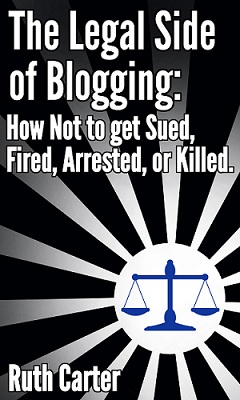
“Stained Glass Window Full of Light and Color” by Stock Photos for Free from Flickr (Creative Commons License)
Since becoming a lawyer in 2011, I’ve had the privilege of working with businesses on a variety of legal issues. Looking back at some of the most cringe-worthy moments I’ve experiences I’ve had and heard about from other business and intellectual property lawyers, I’ve come up with a list of the 10 legal commandments of entrepreneurship:
1. Thou shall have a business entity.
When you start a business, create a business entity – an LLC or corporation. Your accountant can tell you which option is best for you. By separating the business from your personal assets, you limit your personal liability if the business is sued. If you open a business without an entity (aka a sole proprietorship), you don’t have this layer of protection.
2. Thou shall maintain your corporate veil.
Creating a business entity is how you begin to limit your liability, and you perfect that protection with a “corporate veil.” This means having a separate bank account and credit card for the business, and the business accounts pay for business expenses and your personal accounts pay for personal expenses. This creates a clear delineation between where the company ends and the person begins in terms of your finances. If the company is sued and loses, it’s clear which assets belong to the company and your person assets are protected.
3. Thou shall have a signed contract at the beginning of a business relationship.
When you are hired by a client or hire someone, start with a signed contract. A contract is a relationship-management document. It is your master document that puts everyone on the same page regarding their responsibilities. This will help you avoid confusion and resolve problems. When a client comes to me with a problem with a customer, I often start by asking “What does your contract say?”
4. Thou shall be thoughtful and careful about looking online for a contract template.
Looking at templates online is a good place to get ideas about terms you might want to have in your contract, but don’t indiscriminately use any contract you find. You don’t know where it came from or whether it’s suitable for your needs.
5. Thou shall take the time to fully read and understand a contract before signing it.
Never be afraid to ask questions or request changes when considering a contract offered to you. Don’t sign anything you don’t understand, because if you sign it and later regret it, you may be stuck with it.
6. Thou shall respect others’ copyrights.
Do not use others’ work without permission. Create your own original content. It’s ok to be inspired by and quote others, but add something to the conversation. If we’re talking about images, do not pull any image you find using a regular Google search. Seek out sources that provide licenses for use, including images available under Creative Commons. If there is an image you want to use that’s not available, contact the copyright holder and ask for permission. To date, I’ve never had anyone say, “No.”
7. Thou shall check the USPTO before branding a company or product.
When entrepreneurs think “branding,” lawyers think “trademark.” The United States Patent and Trademark Office (USPTO) has a database where you can see what company names, product names, and logos others have applied for and registered for their products and services. You don’t want to fall in love with, or invest a lot of time and money in, a branding idea to find out that it’s already been claimed by someone else.
8. Thou shall outsource your taxes.
Every entrepreneur needs an accountant. Let them do what they’re good at.
In the time it would take you to try to do your own taxes, you could make more than enough money to pay an accountant to do your taxes for you.
9. Thou shall consult thy attorney.
Even when you want to do things yourself, talk to your lawyer to make sure you’re not setting yourself and your business up for future problems. My most cringe-worthy moments as a lawyer have been problems clients created for themselves that we could have helped them avoid completely if they had told us what they were thinking about doing. It is easier and cheaper to prevent legal problems than to fix them.
10. Thou shall act with integrity.
Put your energy into your own business, creating quality products or services for your audience.
You don’t need to stoop to bad-mouthing the competing, using trademarks that are confusing similar to others, or ride other’s coattails by doing things like using a web domain that will allow you to pull an audience based on someone else’ popularity (e.g., cybersquatting). Be so good at what you do that you don’t need to use others to make a name for yourself.
One last note: If you’re an entrepreneur, don’t be afraid to ask for help. Accountants help you make money, lawyers help you keep it, and your peers will share their experiences so you can learn from them. If you are an entrepreneur, or have plans to become one, I hope you have people around you who can help you be successful.
If you want additional information about the legal dos and don’ts of starting and running a business, I maintain a mailing list where I share my thoughts about being a lawyer/entrepreneur, updates about projects I’m working on, upcoming speaking engagements, and I may provide information about products, services, and discounts. Please add yourself if you’re interested. You can also contact me directly or connect with me on Twitter, Facebook, YouTube, or LinkedIn.






